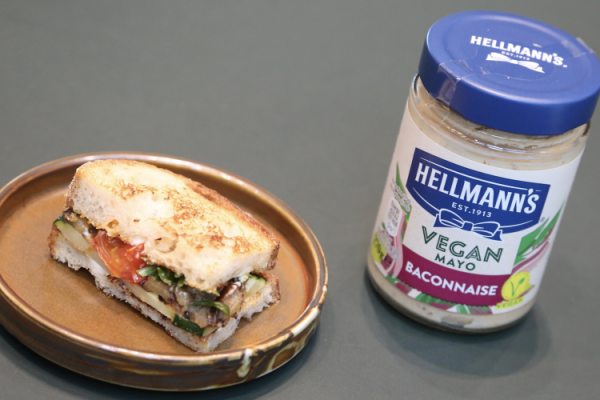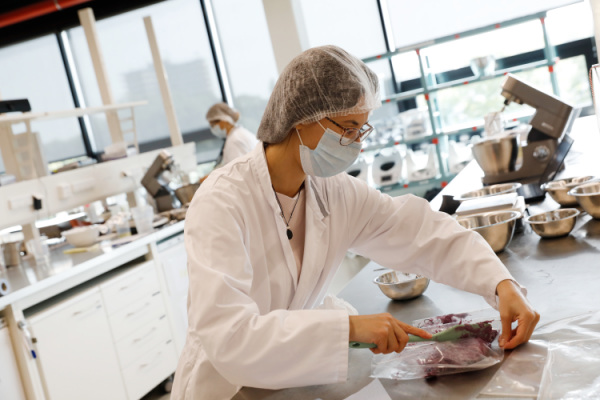A deep dive into Unilever’s plant innovation dynamic
Unilever believes it has developed a growth plan that will be good for the triple bottom line: planet, people and profit.
The group is preparing for a restructuring that will see its nutrition brands become a stand-alone unit separate from its ice cream business. The move emphasizes some of Unilever’s strategic categories: plant-based and positive nutrition products.
The company has set ambitious goals in these areas. As part of its Future Foods strategy, launched in 2020, Unilever aims to reach €1 billion in plant-based sales by 2025-2027 and double the number of products “providing positive nutrition to the world” by ‘ by 2025. The manufacturer from Knorr to Magnum also plans to increase its sourcing of ingredients from regenerative agriculture and achieve net zero emissions by 2039.
Speaking at Hive, Unilever’s innovation hub on the Wageningen University campus, food manager Hanneke Faber said that while the company is “not a charity “, she intends to help correct the current structural flaws in the food system.
“The global food system is not in very good shape. I would even say that it is broken.Faber, who is expected to lead the Nutrition division, said. She highlighted the myriad of issues besetting today’s global food system, from hunger and obesity to GHG emissions and food waste.
“We truly feel responsible for playing a role in creating a fair, healthy and sustainable food system… We want to outperform the competition and we want to do it in a way that is better for people and the planet. “
At the “heart” of this transformation – and indeed of Unilever’s ambitions for regenerative agriculture, positive nutrition and reduced emissions – is plant-based innovation, Faber suggested.
Strengthen the attractiveness of plants
While Faber insisted she’s not asking us all to go vegan, she wants to see us eat plant-based options more often.
How can this be accomplished? Above all, Faber believes that herbal products should be a “fun” and convenient option that requires no compromise from the consumer.
“It has to be easy. No one is interested in being educated…it’s about making it fun,”explained the head of the food industry. “The goal does not have to be virtuous and serious.”
Providing convenient, accessible and attractive plant-based options is an important focus for Unilever’s Hive-based F&B research and development teams. The innovation team works on pure plant-based brands like The Vegetarian Butcher and develops vegan options for its established consumer brands like Hellmann’s Mayonnaise.
Carla Hilhorst, executive vice president of R&D at Unilever, believes that successful innovation starts with understanding the consumer and the ingredients that make up the product.
“It always starts with the consumer and the customer”,She noted, emphasizing the importance of understanding “consumer aspirations and needs” – how they live and buy, what is important to them. “We must then translate [consumer insight] in the technical requirements of the products. Once you have a good understanding of the consumer problem and translate it into technical product requirements, you are halfway to making great products.
And great products are ultimately what is needed to encourage consumers to increase the plant content of their diets, Unilever understands.
“Switching to a more plant-based diet…it’s better for people and the planet,”Hilhorst said. But health and durability alone are not enough. “A consumer is highly unlikely to sacrifice a great taste and food experience just because it’s good for the planet.”
Combining taste and nutrition in plant products
Developing these “great products” is not as simple as it seems. “You almost never have a miracle ingredient” which works on parameters such as taste, texture, shelf life, stability, nutrition and can be used at plant scale, Hilhorst told the audience at the Netherlands Innovation Center .
Unilever flavor expert Alessia Ermacora said taste is “one of the key elements” that will make plant-based alternatives the “first choice” for consumers. Plant-based formulators must develop “authentic” and “rich” flavors by considering sensory attributes such as aroma and juiciness while minimizing the presence of herbal notes and a dry mouthfeel.
“Taste is a non-negotiable… At the same time, we need to raise nutritional standards,” Ermacora has elaborated. This is all the more true as the nutritional profile of plant analogues is scrutinized.
“In plant-based meat, we have developed a number of solutions to effectively reduce the salt level… It’s about adding herbs, spices… the key is to find that balance. “continued the R&D expert.
Finding that balance can be difficult. In response to this, Unilever is working with advanced digital tools that can speed up the recipe ideation process. “We can create taste profiles…put them into our digital model and say we want recipe suggestions where there’s no egg or less salt,”Hilhorst explained. These recipes are then put to the test by Unilever’s R&D teams in the test kitchens of facilities like Hive.
Looking at The Vegetarian Butcher’s vegan mayo and plant-based chicken examples, the chief innovation officer said it’s important to understand the role an ingredient plays in the product matrix, and then “identify a recognizable alternative for consumers and having the same role in the recipe”. Vegetarian Butcher Herbal Chicken Analogs began with an understanding of target taste, texture, mouthfeel, and bite. A recipe was then developed using ingredients such as soy, spices, oil and “flavoring”. “You have a very simple ingredient list that gives consumers confidence in the products.”
Trust and the importance of own labels
The importance of using recognizable ingredients in relatively new product formats cannot be underestimated. “The simplicity of the ingredients and the confidence in the technology is really important”,Hilhorst pointed out.
She acknowledged the disconnect often seen by food industry professionals, who frequently point out that there is a difference between ingredients and processing technologies that are safe and those that inspire consumer confidence.
“A consumer wants food for his family that he trusts… [but] the facts and the perception are not the same. A perfectly safe product may not be perceived as safe by consumers… It is important to understand that there is a perception that is not always aligned with the facts.
“Knowledge does not determine behavior. The more you understand existing consumer behaviors, the more you can use it. »
Trust is also not a static concept and to develop the product formats of the future, Unilever needs to keep an eye on how consumer trust changes over time. “Trust is changing,” Hilhorst noted, adding that trustworthy products of tomorrow will likely reflect issues such as climate change and environmental footprint information.
Proteins of the future: “We need to unleash the power of biotechnology”
Unilever recognizes that the amount of conventional animal protein we consume must be redefined if we are to feed the growing world population within planetary boundaries.
Today, Unilever R&D teams are studying protein diversification from soybeans, peas and wheat to oats, lentils and broad beans. Tomorrow, Vice President of Science and Technology, Manfred Aben, predicted: “we will go beyond this, we must unleash the power of biotechnology”.
The “next level” of innovation is to produce food “without land or water” through “fermentation and microbes,” observed Aben. The science and technology chief categorized emerging alternative protein sources that will “move the needle” into four groups: “sunshine” proteins like duckweed and recycled proteins; single-celled microbial proteins such as microalgae, fungi and bacteria; precision fermentation that produces “animal-like” proteins; and cellular agriculture or laboratory meat.
“We are working on almost all of these elements,”Aben revealed. This work is not directly undertaken by Hive researchers, but the Innovation Center is strategically located on the Wageningen University campus to fit into a larger innovation ecosystem. Indeed, Aben said, collaboration is an important part of Unilever’s innovation strategy and the multinational is collaborating with various start-ups in the future nutrition and protein space. “If we think we can do it alone, we’re really not seeing big enough,”he said.
Unilever is, for example, is working alongside biotech start-up Agenuity to harness the ‘enormous potential’ of microalgae and is collaborating with food tech company ENOUGH, which is opening Europe’s largest mycoprotein production facility.
“We have investments in just about all of these spaces. The cultured meat we think is a little further away, but we think it will happen,”Faber added.
But for these new technologies to gain traction, they must first gain consumer trust. If today’s shoppers are skeptical of unknown ingredients, are they likely to welcome developments such as lab-grown meat? Faber is optimistic. “It’s up to us as companies to make sure it doesn’t look like Franken-food…there are ways to talk about it with consumers.”





Comments are closed.